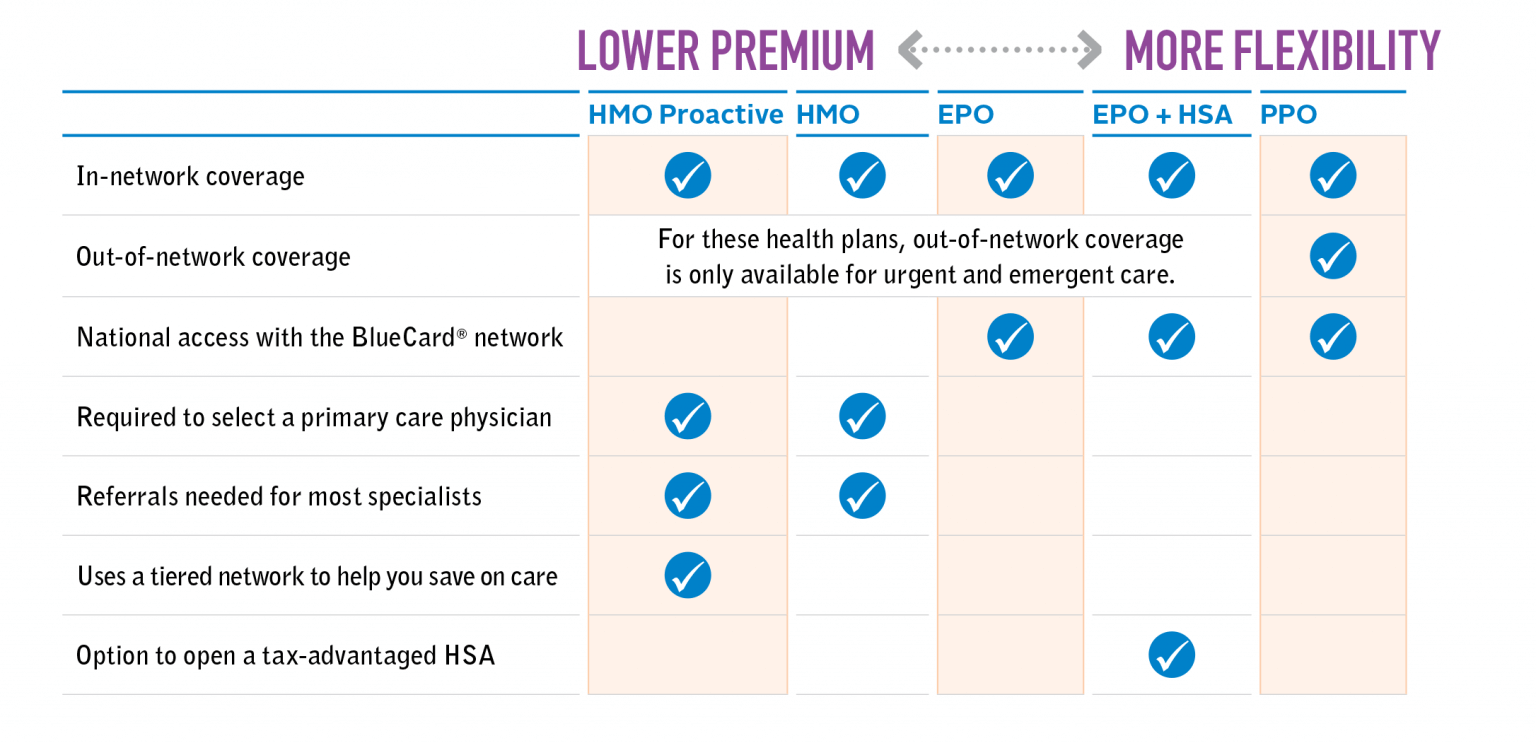HMO vs. PPO: Which health insurance plan is right for you?
If you’re shopping for a health plan, odds are you’ve come across the terms HMO, PPO, and EPO. While there are many different types of health plans out there, these are among the most widely recognized. Here’s a brief review of their features to help you determine which type of plan might be right.
Important key terms
Let’s start with some important key terms you’ll need to understand when comparing plans.
Provider networks
Network providers are the doctors, other health care providers, and hospitals that a health plan contracts with to provide medical care to its members. These providers are called network providers or in-network providers. A provider that isn’t contracted with the plan is called an out-of-network provider. Depending on which type of plan you choose, you may be required to use in-network providers, or you may be free to go outside the network for care.
Find out if your providers participate in the Independence Blue Cross network. Search our provider network
Primary care physician (PCP)
A PCP is the doctor you see for most of your basic health care needs. A PCP focuses on preventive care and treating routine injuries and illnesses and may recommend that you visit a specialist when needed. Depending on the type of plan you choose, you may be required to choose (or designate) a PCP to provide and coordinate your care.
Health Maintenance Organizations (HMO)
What is a Health Maintenance Organization health insurance plan?
HMO stands for Health Maintenance Organization. With an HMO plan, you must choose a PCP. Your PCP will provide checkups and routine care and issue referrals when you need to see a specialist. You’ll need to use doctors and hospitals that are in the plan’s network. Out-of-network services are covered only for urgent care and emergencies. For more detailed information, read What is an HMO?
What is unique about an HMO?
- Provider network ‐ With an HMO plan, you must use in-network providers for all of your care. Out-of-network care is only covered for urgent care and emergencies.
- Primary care physician ‐ With an HMO plan, you must choose (or designate) a network provider to be your PCP. Your PCP will be responsible for managing and coordinating all of your care, including providing referrals to see specialists.
Advantages of HMO vs. PPO plans
HMO plans are generally less expensive than PPO plans. They offer mid-range monthly premiums and, depending on the plan, may have lower out-of-pocket costs.
Preferred Provider Organization (PPO)
What is a Preferred Provider Organization health insurance plan?
PPO stands for Preferred Provider Organization. With a PPO plan, you can visit any doctor or hospital in or out of the network without a referral. You’ll pay less when you use in-network doctors and hospitals and pay more when you use out-of-network ones. For more detailed information, read What is a PPO?
What is unique about a PPO?
- Provider network ‐ With a PPO plan, you’re covered when you use providers both in and out of the network. But you’ll pay less when you use in-network doctors and hospitals and pay more when you use out-of-network ones.
- Primary care physician ‐ With a PPO plan, you are not required to choose (or designate) a PCP. But if you do, they will serve as your personal physician for all routine and preventive health care services. You will save money using an in-network vs. out-of-network PCP.
Advantages of a PPO vs. an HMO plan
PPO plans offer some of the greatest flexibility of all health plan types. PPO members:
- Are not required to choose a PCP
- Can see a specialist without a referral
- Are free to use providers both in and out of the network
What about an Exclusive Provider Organization (EPO) plan?
An EPO plan falls somewhere between an HMO and a PPO health plan in terms of cost and flexibility. With an EPO plan, you have in-network coverage only (except for urgent care and emergencies). However, you aren’t required to select a PCP or get referrals to see specialists. Learn more about EPOs. Read What is an EPO?
At-a-glance comparison between HMO, PPO, and EPO health plan features

Which plan is the best fit for you?
Understanding what you need from a health plan, and how much you can afford to pay (both in monthly premiums and out-of-pocket costs), can help you choose the plan that’s best for you. For example:
- If it’s important to you to see out-of-network doctors without referrals, a PPO may be right for you.
- If you’d rather minimize your health care costs and don’t mind using only in-network providers, an HMO may be the way to go.
As you weigh your options, compare all of our health insurance plans.
Learn more about:
- Independence HMO plans
- Independence HMO Proactive plans
- Independence PPO plans
- Independence EPO plans
We can help you find the health plan that works best for you or your family:
- Call us. Call 1-844-891-0700 (TTY: 711), Monday – Friday, 8 a.m. – 8 p.m. EST.
- Come see us. Meet with a licensed Independence Blue Cross insurance agent who can answer your questions and help you enroll ‐ no appointment is needed. You can find us at Independence LIVE, Monday through Friday, 8 a.m. – 5 p.m.
